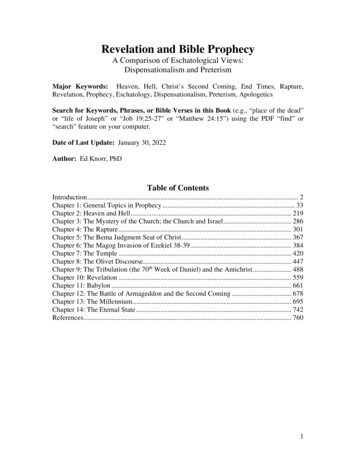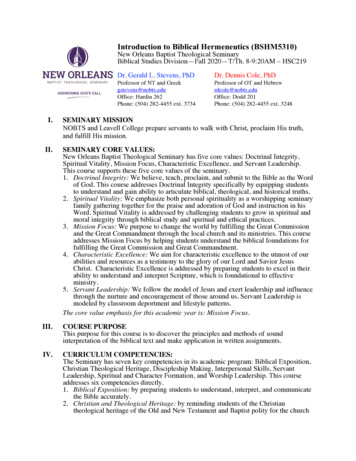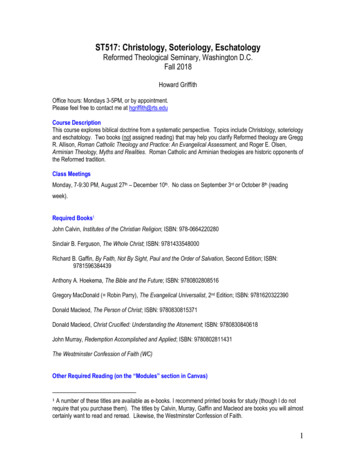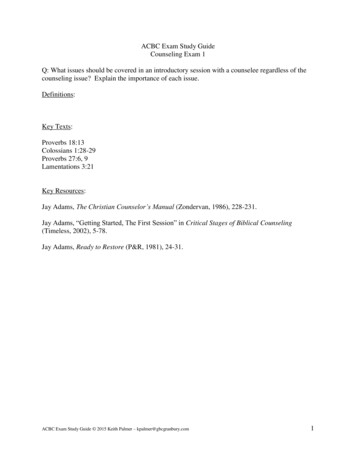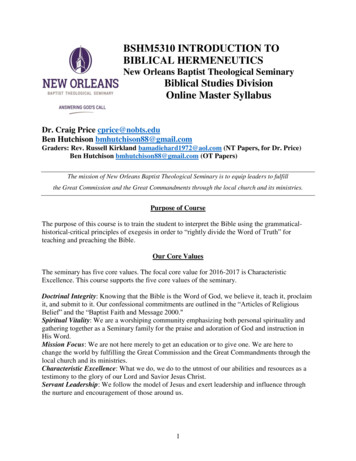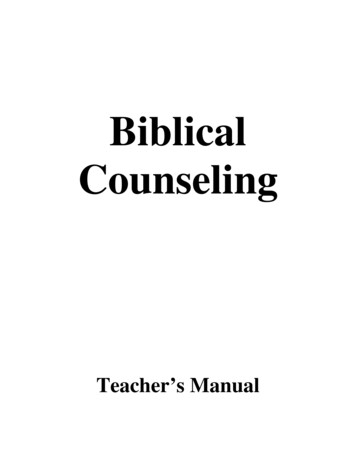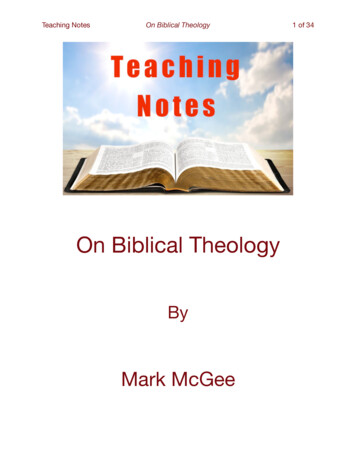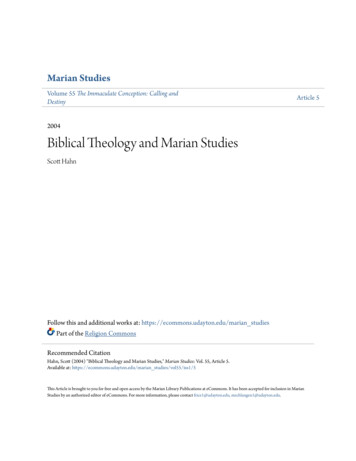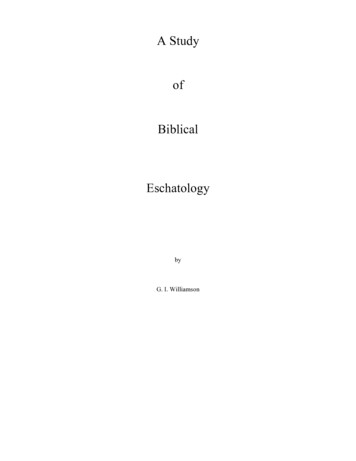
Transcription
A StudyofBiblicalEschatologybyG. I. Williamson
TABLE OF CONTENTSPreface - . 1Introduction - . 3Questions:. 4I THE ESCHATOLOGY OF THE OLD TESTAMENT . 7From Creation to the Fall . 7From the Fall to the Flood . 8From the Flood to the Tower of Babel. 8The Patriarchal Era . 9The National Israel Era . 10The Prophesies of Daniel . 14Questions:. 16The Final Crisis for National Israel . 16Questions:. 22II THE ESCHATOLOGY OF MATTHEW, MARK,LUKE . 25Introduction . 25Questions:. 28Part 1 - The Immediate Context . 28Questions:. 31Part 2 - "All These Things” . 32Questions:. 37Part 3 - Commonly Misunderstood Items . 38Questions:. 42Part 4 - The Most Difficult Points. 43Questions:. 54III THE THESSALONIAN LETTERS . 57Part 1 - The Differing Views . 59Questions:. 61Part 2 - The Main Points . 62The Rebellion . 63The Man of Lawlessness . 64The Restrainer . 66The Relationship . 67i
A Study of Biblical EschatologyQuestions:. 68IV THE ANTICHRIST . 71Questions . 75V THE REVELATION OF JESUS CHRIST . 77Introduction . 77Questions:. 80The Outline of the Book of Revelation . 80Part 1 - The Things That Are (Rev. 2 – 3) . 82Part 2 - The Things That Soon Will Be (Rev. 4 - 20) . 84The Seven Seals (Rev. 4) . 86Revelation 10 . 109Revelation 11 . 113Revelation 12 . 118Revelation 13 . 119Revelation 14 . 123Revelation 15-16 . 124Revelation 17-18 . 125Revelation 18-19 . 132Revelation 20 . 136Revelation 21-22 . 137Conclusion . 141Questions:. 143VI CONFIRMATION IN OTHER SCRIPTURES . 144Some of the Parables of Jesus . 144Paul’s words in 1 Thessalonians 5:1-3 . 144Peter’s warning in his second Epistle 3:3-4 . 145Jude’s warning in verses 17 and 18 . 145We must learn to distinguish. 146Our Reformation Fathers . 146Questions:. 147Appendix 1 – The Synoptic Gospel Accounts . 148Appendix 2 – A Diagram of the View of this Study . 155Appendix 3 – Many Views Attempt Too Much . 156ii
PrefaceIs there a significant difference between our view of the Bible, today,and that of the great Reformers of the 16th century? I believe there is. Ido not think this is intentional. But I do think it is a fact. Our fathers said“All things in Scripture are not alike plain in themselves, nor alike clearunto all: yet those things which are necessary to be known, believed, andobserved for salvation, are so clearly propounded, and opened in someplace of Scripture or other, that not only the learned, but the unlearned,in a due use of the ordinary means, may attain unto a sufficient understanding of them”1 I also believe that two of those doctrines “which arenecessary to be known, believed and observed” are the doctrines of creation and consummation. It is necessary to know how we had our beginning. And it is also necessary to know what is planned by God for us inthe future. And it is my contention that both of these (because they “arenecessary to be known”) have been clearly revealed in Scripture. And bythis I mean revealed in such a clear way that even the non-scholars canunderstand what God says about them.It is this conviction that has led the author to write this study. It is nota big study. But it does not need to be big. There are already hundreds of‘big books’ about the future and just look at the confusion. There is nothing plain and simple about most of them and they leave the non-scholarlywith one basic impression. It is this: ‘ordinary people like me are simplynot competent to reach any firm conclusions about eschatology. It is toodifficult. It is another of those things (like the doctrine of creation) wherewe will have to defer to the experts.’ In other words much of the churchtoday is not unlike the way it was at the time of the Reformation whenthe people who were not expected to read and understand the Bible forthemselves, but were supposed to defer to the experts. So it is the conviction of the writer of this study that what we need, today, is the very samething that was needed in the 16th century. We need to encourage peopleto seriously study the text of the Bible themselves. And then to have thecourage to be willing to test the experts.212Westminster Confession of Faith 1:7See 1 John 4:1 and Acts 17:111
A Study of Biblical EschatologyThe apostle John wrote that this is exactly what we are supposed todo. “Beloved, do not believe every spirit, but test the spirits to see whether they are from God.”3 This is possible because God can hide from thewise and prudent what he reveals to babes.4 John says believers “havebeen anointed by the Holy One” with the result that they “know allthings”5 (Greek: oidate panta). The Greek language has different wordsfor ‘knowing’ and ‘knowledge.’ This term means close to what we meanwhen we speak of ability to discern things. As a pastor for some 60 yearsI can testify that this is true. Some of God’s seasoned saints have a keensense of discernment. They can ‘see’ through many things that dazzleand confuse other people. So they can and do test the experts eventhough they do not know Hebrew and Greek, and haven’t been to Yale orHarvard.I wrote this book, then, for one reason. It is because I do not believethat God gave us a difficult maze or labyrinth—a complicated irregularnetwork of scripture passages in which it is difficult to find one’s wayand is almost impossible to decipher. No, but in a certain real sense theword of God is quite simple! “Do not say in your heart, ‘Who will ascend into heaven?’” or “Who will descend into the abyss?”6 You do nothave to be an expert in astronomy, or a deep-sea explorer to have a rightview of the future. You simply need to study the text — paying closeattention to every word — because “the word is near you” (Rom. 10:8)because God has spoken his truth to us in our human language. And it ismy hope that this small book will help you to ‘see’ for yourself that thisis true.31 John 4:1Matthew 11:2551 John 2:206Romans 10:6-742
INTRODUCTIONThe purpose of this study is a modest one. It is to set forth some ofthe certainties of Biblical eschatology. It is our conviction that no onehas all the answers to questions about the future. It is also our convictionthat the history of the Christian Church teaches us to be modest in ourclaims, and tentative in many details of doctrine of the future. Yet, having said this, it is also our conviction that the main things we need toknow about the future are clearly revealed in the Holy Scriptures. Thematerial that we present in this study is intended to demonstrate this fact.We begin, then, by clearly stating the following time-tested principles ofsound Bible interpretation that we will follow in this study.[1] We begin with the things that are more clear, and then work atthe problem of understanding the things that are less clear. For example: we do not begin with the book of Revelation, and then — afterwe interpret it — go back and impose our interpretation on the Gospelsand the Epistles. No, we begin with what the Gospels say about futurethings, and then go on to more difficult passages in the book of Revelation.[2] The only infallible interpreter of the Bible is the Bible itself,and the Bible is sufficient. There are those, for instance, who say thatthere are things in the Bible — concerning the future — that cannot beunderstood today because we do not have the resources that we need tobe able to understanding them. We believe this is incorrect. It —in effect— denies the sufficiency of the Bible. But the truth is that our problemsare not due to some imagined deficiency in the Bible. No, the source ofthe problem is rather in us — we do not study the Bible with sufficientdiligence and care.[3] The Westminster Confession of Faith is correct when it says“the true and full sense of any Scripture. . .is not manifold but one. . .”It is often assumed, for example, that there is such a thing as a double (oreven a triple) fulfillment of specific prophecies in the Bible. But in thisstudy we will present the evidence that will show why we cannot agreewith this assumption. It is our conviction that Bible prophecies arequite specific, and that they refer to singular events. This does not meanthat there can be no application of the truth contained in a specificprophecy to other times, places and events. There are many things spoken of in the Bible that can only happen once — for example, the world3
A STUDY OF BIBLICAL ESCHATOLOGYwide flood. To expect another world-wide flood is wrong, yet this eventdoes provide many lessons — and teaching principles — which canrightly be applied to people throughout subsequent history. The apostlePeter does this very thing when he compares the folly of sinners at thetime of the world-wide flood with the folly of those who refuse to believe in the coming day of destruction and judgment.7 But what thisshows us is that the application of abiding principles of truth taughtthrough this event is by way of analogy, and not by double fulfillment.[4] The Reformers were right when they taught the perspicuity ofScripture. By this term they meant that the Bible was written clearlyenough to be understood by God’s ‘little’ people. This is what perspicuity means: we can understand what the text of the Bible means by reading it ourselves, if we make good use of things that God himself hasprovided to enable us to do so. These are things such as the historiccreeds of the church, a good dictionary, an exhaustive concordance, andthe use of the kind of commentaries that men such as John Calvin wrotecomparing scripture with scripture in order to clearly understand the textof the Bible.[5] It is therefore our conviction that the logical place to begin, indeveloping a correct view of the future, is the Book of Genesis.In the book of Acts we read of one Jewish Synagogue existing in theApostolic age that accepted the teaching of the apostle Paul. The peopleof the Berean Synagogue accepted his teaching because they found — bya careful study of the text of the Old Testament — that his teaching wasin full accord with those inspired Scriptures.8 So we begin this studywith a summary of the eschatological teaching of the Old Testament.After this we will deal with material found in Matthew 23-25 (andparallel passages in Mark and Luke), and then we will go on toother New Testament material that deals further with the samesubject.Questions:1. How many principles of Bible interpretation, quoted in the introduction, can you restate from memory?782 Peter 3:5-7Acts 17:114
A STUDY OF BIBLICAL ESCHATOLOGY2. Why is it unwise to try to begin to develop a doctrine of last things bystarting in the book of Revelation?3. How would you prove that God’s written word was intended to beread and understood by other than scholars?4. Name some prophetic predictions that cannot possibly have a doublefulfillment.5. Does the doctrine of the perspicuity of Scripture mean that it is easyto understand the Bible? (Can a thing be clear and yet difficult at thesame time?)6. Give at least one good reason for starting the study of Eschatology inthe book of Genesis.5
Chapter 1THE ESCHATOLOGY OF THE OLD TESTAMENTWhat is meant by the word eschatology? One dictionary defines eschatology this way: “It is: (1) a doctrine of the last or final things, especiallydeath, judgment, heaven, and hell; (2) the branch of theology dealing withthese doctrines.” But in this study we will take the word to mean whatever God has revealed concerning things still in the future at the timewhen God revealed them.Reliable information about the future is one of the distinguishingmarks of the true Christian religion, which is taught in the holy Scripturesof the Old and New Testaments. No other religion has anything like theamount of information about the future that we find in the Bible. Likewise,no other religion has anything that even begins to compare with the evidence the Christian religion provides in terms of the historical verificationof its predictions.It is also a fact — contrary to popular misunderstanding — that biblical eschatology is essentially clear and simple. The Bible does not give usa detailed, chronological account of the future, as if it is a kind of historybook written before things happen. Neither does it tell us everything thatwe might like to know. But it does provide information about the mainthings that are going to happen — all of those things that we need to know— and that is what matters.From Creation to the FallEschatology has been a reality, in God’s inspired word, right from thebeginning. God began to reveal his plan for the future right after the human race fell by Adam’s first sin.9 God told Satan there would be conflict9Genesis 3:157
A STUDY OF BIBLICAL ESCHATOLOGYbetween his seed and the seed of the woman, and that he (Satan) would becrushed by her seed [the word seed, here, is masculine singular and wasfulfilled by Jesus as the promised descendant of Eve]. The rest of the Bibleis essentially (1) the story of the manner in which God prepared for thesending of this promised ‘seed of the woman’ person, through the historical events recorded in the Old Testament, and (2) then of how God fulfilledthat ancient promise in the person and work of his ‘only begotten son,’ ourLord Jesus Christ, as recorded in the New Testament.From the Fall to the FloodIn preparation for his promised victory over Satan God determined,first of all, to allow the fallen human race to display its true character. Thisis exactly what we see in the early chapters of the book of Genesis. As thedescendants of Adam multiplied there was an increasing prevalence ofmoral and spiritual deterioration. As one generation succeeded another andyet another, the world was more and more filled with violence,10 andwickedness.11 Yet in spite of — and in the midst of — this process of degeneration, God gave a wonderful indication of his ultimate intention tobless mankind by his translation of Enoch.12 The fact that Enoch, who wasknown as one who walked with God, was taken to heaven by God, musthave made a profound impression on the ancients.Finally, when the wickedness of the human race had manifested itselffully, God sent the world-wide flood. And while the flood was an awesome revelation of God’s wrath against human sin, the preservation of Noah and his family proved that God’s promise remained steadfast.13From the Flood to the Tower of BabelAfter the world-wide flood God revealed to Noah a general outline ofthe future history of mankind, in which he also revealed his intention toshow redemptive favor to two of the three major branches of Noah’s posterity.14 And “although” — by God’s own announced verdict after theflood that, as before — “the imagination of man’s heart is evil from his10Genesis 6:11Genesis 6:5, 1212Genesis 5:21-2413Genesis 9:9-1114Genesis 9:26,27118
A STUDY OF BIBLICAL ESCHATOLOGYyouth,”15 he promised that he would never again destroy every living thingas he had by the flood.God also acted at that time to impose new restraints on the inherentwickedness of the human race. (1) He gave mankind permission to putmurderers to death;16 and (2) divided the human race into factions byconfusing their speech.17 It is commonly thought that division is a greatevil, and sometimes this is indeed the case. And it is certainly a result ofevil. But it can also — as in this instance — be a great blessing becauseit tends to divide Satan’s forces, by bringing it about that one group ofhis servants works against another. Just imagine how difficult it wouldbe for us Christians today if all of the ungodly forces of the world wereunited? (It is for our benefit, for example, that there are sharp divisionsamong the Islamic people!) God instituted division in the first instanceby causing a confusion in language. This resulted in the scattering of thehuman race over the entire world (Gen. 11:8).18The Patriarchal EraAfter the human race finally did begin to multiply and disperseover the earth, God called Abram19 out of the traditional idolatry of hisfamily line20 in order to establish his covenant of grace in the worldsaying “in you all the families of the earth shall be blessed.”21 Thispromise was repeated and enlarged upon throughout the patriarchal period (the era of Abraham, Isaac and Jacob).22 Especially, as recorded inGenesis 22:17,18, God made it clear that while his promise was concentrated in Abraham’s ‘seed’ [the word ‘seed’ is singular, meaning one person(cf. Galatians 3:16)] it would nevertheless also embody a multitude ofpeople comparable in number to the grains of sand on the seashore, orof the stars of heaven.23 Later promises — centering in and revolvingaround the nation claiming Abrahamic paternity — were never such as toeclipse the grandeur of that original promise.15Genesis 8:21Genesis 9:617Genesis 1118Genesis 11:819God later changed his name to Abraham.20Joshua 24:221Genesis 12:1-322See Gen. 18:18, 22:18, 26:4 etc.23Genesis 22:17169
A STUDY OF BIBLICAL ESCHATOLOGYAbraham himself prophesied that his descendants would suffer affliction and servitude for about 400 years, and yet emerge from thatordeal as a nation.24 And the patriarch Jacob — as he was dying —prophesied the special Kingly role which was to emerge from the tribeof Judah,25 an event that was then still hundreds of years in the future.The National Israel EraThen, over three hundreds of years later, God raised up Moses to deliver his people from bondage in Egypt, and to establish them as a nation.Without question, therefore, the nation of Israel was favored by God — formany centuries — more than any other nation.26 Yet even during this earlyhistory true believers in the nation of Israel always recognized that theirspecial status was not given to them because they deserved it.27 Even Moses, who was given a place of unparalleled authority over God’s people,did not exalt himself to any kind of supreme or ultimate status, but spokeof a future prophet whose word would have an authority surpassing hisown.28Throughout the entire history of the nation of Israel, inspired prophetsalways kept in mind the original promise (that in Abraham’s seed all nations of the earth would be blessed) or, in other words, that the promisedMessiah’s dominion would be world-wide in extent.29 So, in spite of Israel’s long-held — and highly privileged — position, it must never be forgotten that there was a constant manifestation of antagonism toward Godwithin that nation. The writings of prophets such as Isaiah and Jeremiahare full of proof of Israel’s unfaithfulness. And Jesus himself summed upthe truth about Israel’s constant tendency to depart from God in his parableof the Wicked Vinedresser.30 In this parable Jesus showed how, again andagain, the nation of Israel persecuted the prophets that God had sent tothem, and then, in the end, were even ready to kill the son of the owner oftheir nation. He ended this parable with a warning: “Therefore I tell you,the kingdom of God will be taken away from you and given to a peopleproducing its fruits.” And “when the chief priests and the Pharisees heard24Genesis 15:12-14Genesis 49:8-1226See especially Deuteronomy 4:1-1427Deuteronomy 7:7-828Deuteronomy 18:15-2229Psalm 72:8, 11, 17; Isaiah 49:6 etc.30Matthew 21:33-442510
A STUDY OF BIBLICAL ESCHATOLOGYhis parables, they perceived that he was speaking about them.”31 What thisshows is the inescapable fact that the unfaithfulness of the nation of Israelwas reaching its climax in that generation. This was further emphasized byour Lord himself in his lament over Jerusalem. “O Jerusalem, Jerusalem,”he cried, “the city that kills the prophets and stones those who are sent toit! How often would I have gathered your children together as a hengathers her brood under her wings, and you would not! Behold, yourhouse is left to you desolate.”32As the Old Testament period of history drew to a close, then, we seethat there was a seemingly insoluble problem! How could God [1] dealjustly with an increasingly apostate people and yet — at the same time —[2] keep the promise he had made to Abraham (that all nations would beblessed in his seed)? The answer to that seemingly insoluble problem was[1] the person and work of Jesus Christ and [2] the emergence of theChristian Church. Jesus commanded his apostles to begin the task of taking the message of salvation to all nations.33 And that message was to theeffect that any and all people who repent of their sins and believe in him asthe promised Messiah are, by that very fact, “Abraham’s seed and heirsaccording to the promise.”34 For—as the Apostle Paul put it—“in ChristJesus you who once were far off have been made near by the blood ofChrist. For he himself is our peace, who has made both one for throughhim we both have access by one Spirit to the Father.”35 “For as many ofyou as were baptized into Christ have put on Christ. There is neither Jewnor Greek, there is neither slave nor free, there is neither male nor female;for you are all one in Christ Jesus. And if you are Christ’s, then you areAbraham’s seed, and heirs according to the promise.”36 “For He Himselfis our peace, who has made both one, and has broken down the middlewall of separation so as to create in himself one new man from the two,thus making peace Now, therefore, you are no longer strangers and foreigners, but fellow citizens with the saints and members of the householdof God, having been built on the foundation of the apostles and prophets,Jesus Christ Himself being the chief cornerstone, in whom the whole building, being fitted together, grows into a holy temple in the Lord, in whom31Matthew 21:43, 45Matthew 23:37-38.33Matthew 28;18-2034Galatians 3:2935Ephesians 2:13-14, 18.36Galatians 3:27-293211
A STUDY OF BIBLICAL ESCHATOLOGYyou also are being built together for a dwelling place of God in the Spirit.”37This astonishing change — termination of the special status of theJewish people while enhancing the status of the Gentiles — surely ranks asone of the most momentous events in all history. It is hardly surprising,therefore, that it was difficult for people to adjust to this change. It waseven difficult for Peter38 and for the other apostles.39 It is also clear thatthis momentous change was a constant issue that Paul encountered in theJewish Synagogues that he visited throughout the Roman Empire. It is nodoubt for this reason that he dealt with this issue in his letter to the Romans. In Chapter 11:1 he asks: “Has God cast away his people?” His answer is: “By no means! For I myself am an Israelite, a descendant ofAbraham, a member of the tribe of Benjamin.” To many Jews living at thattime Paul’s teaching seemed to them to imply the very thing he was careful to deny. But no, he says, “God has not rejected his people whom heforeknew” (v. 2). He then goes on to prove that this ‘problem’ whichseemed so strange to them was not really anything new. He cites as proofthe fact that when the Northern Kingdom of Israel — as a whole — became idolatrous, yet God reserved 7,000 in the midst of the apostasy whodid not bow the knee to Baal.40 Then he says “so too at the present timethere is a remnant, chosen by grace.”41 In other words, God has never allowed all of the members of his church to fall into unbelief and ungodliness. No, he has always preserved at least a small remnant.It’s not possible to go into much detail here, but in his Epistle to theRomans the Apostle brings out certain principles that vindicate his claimthat God did not go back on his word. For proof he cites two unarguableprinciples: (1) The first is the fact that “they are not all Israel who are ofIsrael, nor are they all children because they are the seed of Abraham ”42 In other words, being born a Jew never was enough, in and ofitself alone, to guarantee salvation. There always were some descendantsof Abraham who were not true believers. (2) The second principle is therefore the fact that “no one is a Jew who is merely one outwardly, nor is circumcision outward and physical, but a Jew is one inwardly, and circumci37Ephesians 2:14 22.38Acts 10:9-16, 28.Acts 1:7-8.401 Kings 19:1841Romans 11:542Romans 9:63912
A STUDY OF BIBLICAL ESCHATOLOGYsion is a matter of the heart, by the Spirit, not by the letter. His praise isnot from man but from God.”43 Far more important than being born ofJewish parents is the new birth which spoken of by Jesus (John 3). If youhave that new birth, from above, then you will be saved even though youare not a physical descendant of Abraham.Old Testament history clearly proves that these two principles havealways been evident in God’s dealings with people. The followingfacts demonstrate this conclusively. (1) When Abraham was givencircumcision as the sign and seal of the covenant it was also given toseveral hundred men44 in his household none of whom were descendantsof Abraham according to the flesh — except for one, Ishmael, who turnedout to be an unbeliever.45 (2) Throughout Old Testament history there weresome Gentiles who were assimilated into the Jewish Nation, in otherwords they became Jews (think of Rahab, Ruth, and the Rechabites).46 (3)The Old Testament history also shows that significant numbers of those whowere born Jews (even ten of the twelve tribes, in later Jewish history) werecut out of the covenant nation.47 These undeniable facts prove that God’scovenant was never based on mere fleshly descent. (From the beginninghaving Abrahamic blood in one’s veins was not required for full membership with the covenant people, nor was it a guarantee of continuancein it).What all this confirms is that God did not go back on any of hispromises when he reduced the special status of the nation of Israel, andtransformed the remnant out of that nation into an international entitycalled the Christian Church. Indeed: this is precisely what was promised from the beginning! As Paul himself put it: “Just as you [Gentiles]were at one time disobedient to God but now have received mercy because of their disobedience, so they [the Jews] too have now been disobedient in order that by the mercy shown to you they also may now receive mercy. For God has consigned all to disobedience, that he mayhave mercy on all. Oh, the d
[2] The only infallible interpreter of the Bible is the Bible itself, and the Bible is sufficient. There are those, for instance, who say that there are things in the Bible — concerning the future — that cannot be understood today because we do not have the resources that we need to be
